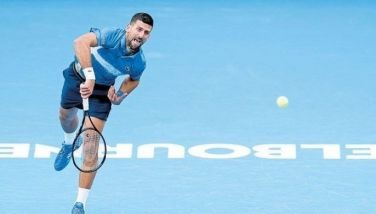SEA Games broadcast deadline up
August 6, 2001 | 12:00am
This week is the ultimate deadline for the National Broadcasting Network (formerly People’s Television or PTV) to decide whether or not to pursue its coverage of the Southeast Asian Games in Kuala Lumpur, Malaysia, next month. Financially, the network is in a bind, needing to raise the necessary capital for the multi-sport broadcast.
"We lost our shirt in the last Olympics, as you know," admits Mia Concio Imperial, chairman and president of NBN. "We certainly do not want that to happen again."
Having the rare distinction of being an Asian Broadcasting Union, NBN is allowed to bid for international sporting events like the Olympic Games, Asian Games and SEA Games. This year the broadcast rights alone cost a whopping P3.5 million. The network still has to raise at least another P10 million for satellite charges, accommodations and talent fees. Considering how close it is to the actual event, booking a hotel close to the venues (a necessary convenience given the load of the broadcasters) will be impossible.
During the Atlanta Olympics, PTV shipped 70 crates of equipment and dozens of personnel to the United States for the Games. Coverage ran roughly 16 hours a day. Videotape recorders were taping up to 16 events simultaneously. In fact, those of us who were on-camera talents then worked almost the entire time, either live in the studio or venues, or annotating off-tube. That is what it took.
The last time the Southeast Asian Games was not broadcast in the Philippines was in 1989, ironically, also the last time the event was held in Kuala Lumpur. That SEAG was remembered of massive cheating that went on, particularly in sports like basketball, tennis, some martial arts and a few other sports. Even Indonesia, leading the medal standings, walked out of at least one event. Our men’s basketball team, which included players like Bonel Balingit and Jun Reyes, got into a fistfight with Thailand, aggravated by what they felt was one-sided officiating. Unfortunately, the only Philippine television broadcasters there to document all this was a backpack crew from ABS-CBN news.
Imperial is the eldest child of renowned film director Lupita Kashiwara, and has been involved with television and film production and acquisition for many years. Since her appointment upon President Gloria Arroyo’s assumption of power, she has strived to bring the government network out of the rut it has long been in, languishing at the bottom of the ratings.
The main problem now is coming up with the P15 million or so needed to at least break even. Imperial was in an out of town meeting with potential financiers to solve the problem. Exacerbating matters in the fact that we will most likely not field a team in basketball, the centerpiece event for the Filipino audience.
"There is the perception that we can bring in P20 million, but without basketball, maybe just P13 million," Imperial continues. "We have written to government financial institutions, even PAGCOR and PCSO, to help us, para sa bayan. We have even approached private corporations for funding. But we’re running out of time."
So this is what it comes down to: a grand opportunity for us to lift up our Filipino athletes and our national network at the same time. When you think about it, the amounts involved are not staggering, but it will go a long way to helping inspire our countrymen, acknowledging the unheralded work of our athletes, and perhaps bring some badly-needed luster to NBN. Lord knows we need all of that.
This is the chance for us to band together. Regardless of whether or not we’re playing basketball in Malaysia, whether or not we consider the SEA Games a worthy competition, we must prove ourselves. If we cannot even muster the will to support ourselves in the SEA Games, how can we even look beyond it to greater goals?
Let us take the opportunity to serve ourselves. We can’t count on anyone else.
"We lost our shirt in the last Olympics, as you know," admits Mia Concio Imperial, chairman and president of NBN. "We certainly do not want that to happen again."
Having the rare distinction of being an Asian Broadcasting Union, NBN is allowed to bid for international sporting events like the Olympic Games, Asian Games and SEA Games. This year the broadcast rights alone cost a whopping P3.5 million. The network still has to raise at least another P10 million for satellite charges, accommodations and talent fees. Considering how close it is to the actual event, booking a hotel close to the venues (a necessary convenience given the load of the broadcasters) will be impossible.
During the Atlanta Olympics, PTV shipped 70 crates of equipment and dozens of personnel to the United States for the Games. Coverage ran roughly 16 hours a day. Videotape recorders were taping up to 16 events simultaneously. In fact, those of us who were on-camera talents then worked almost the entire time, either live in the studio or venues, or annotating off-tube. That is what it took.
The last time the Southeast Asian Games was not broadcast in the Philippines was in 1989, ironically, also the last time the event was held in Kuala Lumpur. That SEAG was remembered of massive cheating that went on, particularly in sports like basketball, tennis, some martial arts and a few other sports. Even Indonesia, leading the medal standings, walked out of at least one event. Our men’s basketball team, which included players like Bonel Balingit and Jun Reyes, got into a fistfight with Thailand, aggravated by what they felt was one-sided officiating. Unfortunately, the only Philippine television broadcasters there to document all this was a backpack crew from ABS-CBN news.
Imperial is the eldest child of renowned film director Lupita Kashiwara, and has been involved with television and film production and acquisition for many years. Since her appointment upon President Gloria Arroyo’s assumption of power, she has strived to bring the government network out of the rut it has long been in, languishing at the bottom of the ratings.
The main problem now is coming up with the P15 million or so needed to at least break even. Imperial was in an out of town meeting with potential financiers to solve the problem. Exacerbating matters in the fact that we will most likely not field a team in basketball, the centerpiece event for the Filipino audience.
"There is the perception that we can bring in P20 million, but without basketball, maybe just P13 million," Imperial continues. "We have written to government financial institutions, even PAGCOR and PCSO, to help us, para sa bayan. We have even approached private corporations for funding. But we’re running out of time."
So this is what it comes down to: a grand opportunity for us to lift up our Filipino athletes and our national network at the same time. When you think about it, the amounts involved are not staggering, but it will go a long way to helping inspire our countrymen, acknowledging the unheralded work of our athletes, and perhaps bring some badly-needed luster to NBN. Lord knows we need all of that.
This is the chance for us to band together. Regardless of whether or not we’re playing basketball in Malaysia, whether or not we consider the SEA Games a worthy competition, we must prove ourselves. If we cannot even muster the will to support ourselves in the SEA Games, how can we even look beyond it to greater goals?
Let us take the opportunity to serve ourselves. We can’t count on anyone else.
BrandSpace Articles
<
>
- Latest
- Trending
Trending
Latest
Trending
Latest
Recommended


























